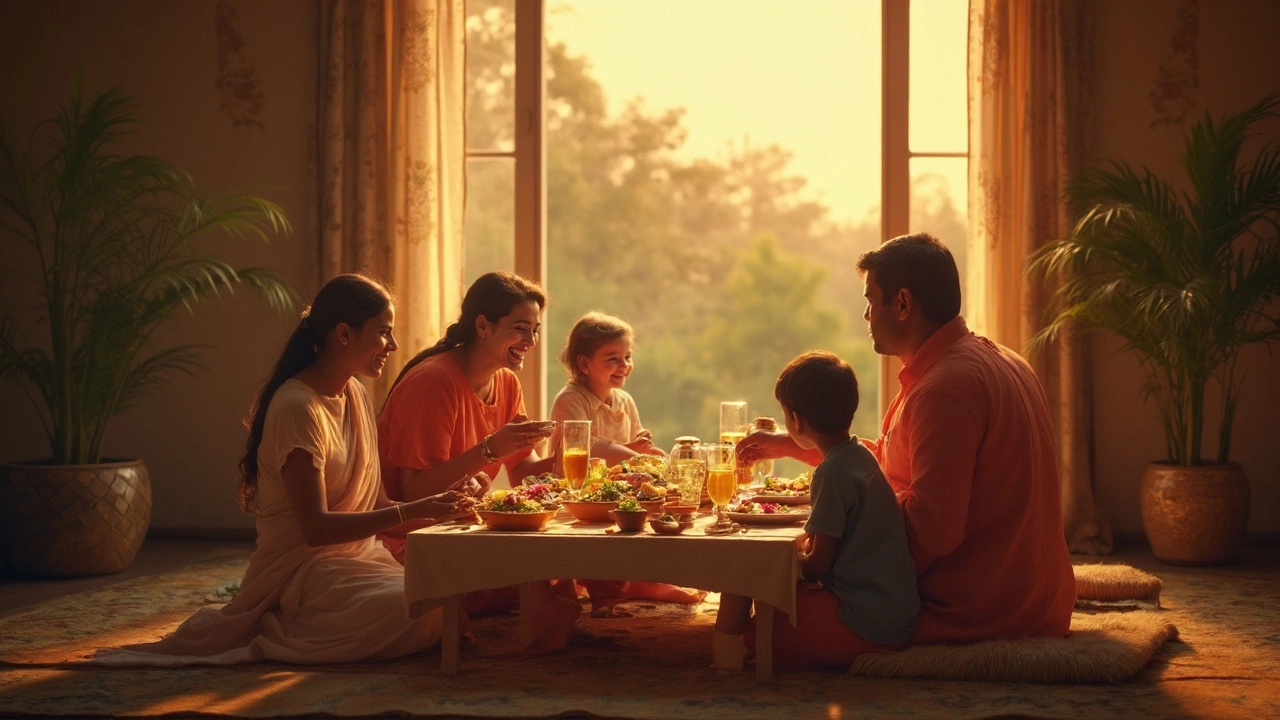If you think dinner timing is just about personal preference or fighting off late-night cravings, Ayurveda has a totally different take. Your body follows a schedule, and when you eat can mean the difference between waking up refreshed or feeling like a sloth the next morning.
Ayurveda, which has shaped eating habits in India for centuries, believes your digestive fire—called ‘Agni’—is the real boss here. Eating too late? That fire is weak, which means your body struggles to break down food. Eat at the right time, and your body gets the most from your meal, without leaving you bloated or sluggish.
Most people don’t realize that the hours after sunset are when digestion starts to slow down. Still grabbing dinner at 10 pm after a Netflix binge? That’s basically working against how your body wants to function. And I get it, life sometimes gets in the way—my family isn’t always perfect with this either, especially when we’re chasing Nirvaan around the house. But understanding why this matters makes it much easier to stick to better habits most days.
- Why Dinner Timing Matters in Ayurveda
- How Your Body Clock Influences Digestion
- Ideal Dinner Time: What Ayurveda Suggests
- What Happens If You Eat Late?
- Real-World Tips for Busy Evenings
- Small Tweaks, Big Results: Making Your Dinner Ayurvedic
Why Dinner Timing Matters in Ayurveda
Ayurveda puts a big focus on timing, especially when it comes to your main meals. It’s not just about what you eat, but when you eat it. Dinner timing is a key part of keeping your digestion running well and making sure your body can properly absorb what you’ve eaten. According to Ayurveda, your digestive fire—"Agni"—follows a daily cycle and is strongest around noon, then starts to cool down as evening approaches.
Here’s why that matters: Eating a heavy meal late means your Agni is going on low power just as you throw a big job its way. Think of it like expecting your phone to charge on 1% battery power. The chance of sluggishness, heaviness, and even disturbed sleep goes up the later you eat.
Traditional Ayurvedic texts recommend eating dinner at least 2-3 hours before bedtime to make sure your food is properly digested. If dinner happens too close to sleep, undigested food can lead to toxins (ama) in your body, which can cause problems like poor metabolism, weight gain, or morning brain fog.
- Your body’s internal clock—called the circadian rhythm—starts signaling “slow down” after sunset, making late meals harder to process.
- One study from the National Institute of Nutrition in Hyderabad found that eating before 8 pm, especially a lighter dinner, helped participants feel more energetic and lowered acid reflux complaints.
- Ayurveda says the ‘Kapha’ dosha takes over in the evening, and it’s associated with slower digestion.
| Time of Dinner | Estimated Digestion Strength (from Ayurveda) | Common Effects |
|---|---|---|
| Before 7 pm | Moderate | Better sleep, lighter feeling in morning |
| 7-9 pm | Low | Mild heaviness, possible disturbed sleep |
| After 9 pm | Very Low | Bloating, poor sleep, morning grogginess |
So, if you want your body to thank you in the morning, getting your dinner in earlier really makes a difference. You don’t need to overhaul your entire schedule overnight, but a simple shift towards an earlier, lighter dinner is one of the most practical moves you can make for better health, according to Ayurveda.
How Your Body Clock Influences Digestion
Your body isn’t running on random mode—it follows a daily rhythm called the circadian clock. That clock tells your body when to feel sleepy, when to perk up, and even when your stomach is ready to tackle food. According to Ayurveda, this rhythm is tied to the movement of the sun. When the sun is high, around noon, your digestive fire or 'Agni' is at its strongest. By evening, as the sun dips down, your digestion slows too.
A lot of science backs this up. Studies show our gut actually produces more digestive enzymes and moves food faster through the system during the day than at night. This means you break down and absorb your food much better earlier than later. Eating heavy meals after 8 p.m. often leads to poor sleep and extra pounds—not just because of what you eat, but when you eat it.
Here’s a snapshot of how your body handles food through the day:
| Time of Day | Digestive Power | Recommended Meals |
|---|---|---|
| 6–10 am | Low to Moderate | Light Breakfast |
| 10 am–2 pm | Peak | Biggest Meal (Lunch) |
| 2–6 pm | Decreasing | Light Snacks |
| 6–8 pm | Low | Light Dinner |
| After 8 pm | Very Low | Avoid Eating |
Ever wondered why eating late often leaves you groggy or gives you those midnight food regrets? It’s because your digestive engine is practically snoozing after dark. That’s why Ayurveda always pushes for eating earlier. It gives your gut a fair shot at processing the meal before bedtime, and your body gets a full night of real rest instead of churning through that late-night biryani.
Ideal Dinner Time: What Ayurveda Suggests
So, when exactly should you be eating dinner if you’re following Ayurveda? The sweet spot is actually much earlier than most people think. Ayurveda recommends wrapping up dinner between 6:30 pm and 8:00 pm. The main reason is pretty simple: your body’s digestive fire, called Agni, is strongest during the day and starts to fade after sunset. Catching dinner before 8 pm means your digestive system gets a chance to do its job before things slow down for the night.
Here’s a quick look at how digestive strength changes through the day according to Ayurveda:
| Time | Ayurvedic Guidance | Digestive Strength |
|---|---|---|
| 12:00 pm – 1:30 pm | Lunch (Main meal) | Strongest |
| 6:30 pm – 8:00 pm | Best time to eat dinner | Moderate |
| After 8:30 pm | Should be avoided | Weak |
Basically, late-night meals create more work for your body and can leave you feeling heavy or lead to issues like poor sleep, acidity, or even weight gain. Ayurveda experts often suggest keeping a 2–3 hour gap between dinner and going to bed. That means if you usually sleep at 10:30 pm, aim to finish dinner by 8 pm max.
If life throws you a late meeting or a dance practice for the kids, don’t panic. Try to keep dinner light—think dal, rice, and some simple vegetables, not a heavy biryani. By keeping it simple and sticking to the early window, you’ll notice your digestion and sleep are both way better.
- Eat dinner before 8 pm whenever possible.
- Leave at least 2 hours between dinner and bedtime.
- Keep dinners lighter compared to lunch.
- Go for warm, freshly cooked meals instead of cold or leftover food at night.
If you stick to these basic dinner timing tips, you’ll see the difference—more energy, less heaviness, and better moods in the morning. My own family, including Nirvaan, definitely sleeps better when we manage to eat before 8. It’s a small shift that pays off big-time.

What Happens If You Eat Late?
Ever wondered why you feel stuffed, restless, or just plain tired after a late-night dinner? Ayurveda says it's all about how your body’s digestive fire cools down as the sun goes down. When you sit down to eat past your sweet spot—usually after 8 pm—your body can't digest food the way it should. That sluggish digestion leads to leftover food hanging out in your stomach, which can make you toss and turn at night instead of getting deep, solid sleep.
One big thing that happens is your body creates something called “Ama,” which just means toxins caused by undigested food. Ama isn’t just an Ayurvedic buzzword. It’s linked to real-world stuff like acid reflux, gas, and feeling bloated in everyday life. Over time, it can mess with your energy levels and make you aggravated or moody for no reason. Not exactly what you want if you’ve got work, kids, or just want to feel human the next day.
Modern research actually backs up what Ayurveda’s been saying for ages. Eating late at night has been connected to increased fat storage, higher blood sugar, and even weight gain. You might notice you wake up tired even if you clocked eight hours—that's your gut still working overtime when it should've been resting. The best dinner time isn’t just tradition, it’s biology.
- Bloating and indigestion are more likely.
- Sleep gets disturbed because your body is working on digestion, not rest.
- You’re at higher risk for acid reflux and heartburn, especially if you lie down soon after eating.
- It’s much harder to stick to a healthy weight or manage blood sugar.
If you're trying to help your family feel their best, sticking to an earlier dinner makes a real difference. Trust me, I’ve seen it at home—Nitya and I noticed we feel way lighter and actually wake up ready to go if we eat before 8 pm. Late dinners? Instant regret the next morning.
Real-World Tips for Busy Evenings
Life doesn't slow down just because Ayurveda recommends an early dinner. Families juggle school runs, meetings, crazy traffic, and a hundred other things. So how do you get close to the ideal dinner time without losing your mind?
First, don’t aim for perfection—aim for progress. The sweet spot Ayurveda suggests for dinner is between 6:30 pm and 8:00 pm. In a 2022 survey by the Indian Dietetic Association, only about 24% of urban families actually eat before 8 pm. Most people eat much later. So you’re not alone if you’re running behind.
- Plan ahead: Prepping veggies and chapati dough in the morning makes life way easier by evening. If my son Nirvaan is keeping us busy, Nitya and I rely on batch-cooked dals or khichdi from our Sunday meal prep.
- Shift dinner routines gradually: If you’re used to eating at 10 pm, cut it back by 30 minutes each week until you get closer to 7:30 pm.
- Keep it light if you’re eating late: Instead of heavy curries or fried stuff, go for soups, steamed veggies, or moong dal. Your digestive system will thank you the next morning.
- Make the dinner table screen-free: When you eat with your family (and not your phone or TV), you eat slower and recognize when you’re actually full.
- Set a tiny evening alarm: Try an 8 pm phone reminder so you don’t forget dinner while chasing deadlines or the next episode of your favorite series.
| Dinner Habit | Impact on Digestion |
|---|---|
| Eating before 8 pm | Boosts digestion, supports better sleep |
| Eating after 9:30 pm | Can cause heaviness, bloating, poor sleep |
| Heavy, fried foods | Slows digestion, increases next-day sluggishness |
| Light, warm meals | Easier on the stomach, promotes overnight repair |
Look, nobody gets it right every day. Some nights, you’ll be eating late or grabbing a sandwich at your desk. That’s fine—just do better when you can. Even a small shift toward an earlier, lighter dinner pays off in energy levels, sleep quality, and next-day mood. Small wins add up, so pick one tip and see how it fits your routine.
Small Tweaks, Big Results: Making Your Dinner Ayurvedic
You don’t need to overhaul your entire lifestyle to bring some Ayurvedic wisdom to your dinner routine. Small, doable changes can make your nightly meal work for you, not against you. Here’s how you can get started without stressing out.
- Best dinner time: Ayurveda says you should eat dinner at least 2-3 hours before bedtime, ideally before 8 pm. This gives your body enough time to digest food before sleep. People who actually followed this noticed they slept better and had less bloating.
- Go light at night: Keep your dinner simple and light. Think vegetable soups, lentil dals, or khichdi instead of fried or heavy meats. Heavy meals at night can sit in your stomach and zap your energy by morning.
- Stay warm: Favor warm, cooked foods over cold salads or leftovers from the fridge. Warm meals kickstart digestion, which tends to slow down in the evening anyway.
- Add a pinch of ginger: A tiny amount of fresh ginger or a dash of asafoetida (hing) in your dishes can boost digestion. My family loves a bit of grated ginger in dal. It’s a game-changer for reducing after-dinner discomfort.
- No distractions: Try eating dinner without screens—TV, phones, even scrolling. Ayurveda always talks about mindful eating. When you’re distracted, you lose track of feeling full or satisfied, often leading to overeating.
- Go easy on the water: Avoid gulping down lots of cold water with your meal. Sip small amounts of warm water if you’re thirsty. Cold drinks can put out your digestive fire.
If you’re working late or have unpredictable days, prep a light one-pot meal in advance or keep a few quick-fix recipes handy. Even doing two or three tweaks a few nights a week can help your digestion run better. You’ll probably notice changes in your sleep and next-morning energy before you know it. Ayurveda doesn’t expect perfection—just a bit of consistency.






